Related Research Articles

Marcus Aurelius Antoninus was Roman emperor from 161 to 180 and a Stoic philosopher. He was the last of the rulers known as the Five Good Emperors, and the last emperor of the Pax Romana, an age of relative peace and stability for the Roman Empire. He served as Roman consul in 140, 145, and 161.

Sir William Ramsay was a Scottish chemist who discovered the noble gases and received the Nobel Prize in Chemistry in 1904 "in recognition of his services in the discovery of the inert gaseous elements in air" along with his collaborator, John William Strutt, 3rd Baron Rayleigh, who received the Nobel Prize in Physics that same year for their discovery of argon. After the two men identified argon, Ramsay investigated other atmospheric gases. His work in isolating argon, helium, neon, krypton and xenon led to the development of a new section of the periodic table.

Jean Lafitte was a French pirate and privateer who operated in the Gulf of Mexico in the early 19th century. He and his older brother Pierre spelled their last name Laffite, but English language documents of the time used "Lafitte". This has become the common spelling in the United States, including places named after him.

Aulus Gellius was a Roman author and grammarian, who was probably born and certainly brought up in Rome. He was educated in Athens, after which he returned to Rome. He is famous for his Attic Nights, a commonplace book, or compilation of notes on grammar, philosophy, history, antiquarianism, and other subjects, preserving fragments of the works of many authors who might otherwise be unknown today.
Lucius Annaeus Seneca the Elder, also known as Seneca the Rhetorician, was a Roman writer, born of a wealthy equestrian family of Corduba, Hispania. He wrote a collection of reminiscences about the Roman schools of rhetoric, six books of which are extant in a more or less complete state and five others in epitome only. His principal work, a history of Roman affairs from the beginning of the Civil Wars until the last years of his life, is almost entirely lost to posterity. Seneca lived through the reigns of three significant emperors; Augustus, Tiberius and Caligula. He was the father of Lucius Junius Gallio Annaeanus, best known as a Proconsul of Achaia; his second son was the dramatist and Stoic philosopher Seneca the Younger (Lucius), who was tutor of Nero, and his third son, Marcus Annaeus Mela, became the father of the poet Lucan.

Sir William Mitchell Ramsay, FBA was a Scottish archaeologist and New Testament scholar. By his death in 1939 he had become the foremost authority of his day on the history of Asia Minor and a leading scholar in the study of the New Testament.

Isauria, in ancient geography, is a rugged isolated district in the interior of South Asia Minor, of very different extent at different periods, but generally covering what is now the district of Bozkır and its surroundings in the Konya Province of Turkey, or the core of the Taurus Mountains. In its coastal extension it bordered on Cilicia.

Allan Ramsay was a prominent Scottish portrait-painter.
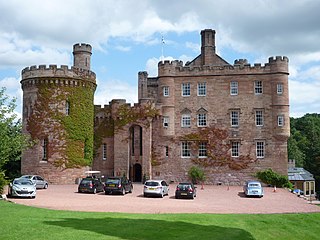
Earl of Dalhousie, in the County of Midlothian, is a title in the Peerage of Scotland, held by the Chief of Clan Ramsay.

Captain Archibald Henry Maule Ramsay was a British Army officer who later went into politics as a Scottish Unionist Member of Parliament (MP). From the late 1930s, he developed increasingly strident antisemitic views. In 1940, after his involvement with a suspected spy at the United States embassy, he became the only British MP to be interned under Defence Regulation 18B.
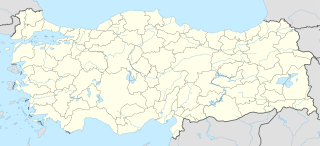
Lystra was a city in central Anatolia, now part of present-day Turkey. It is mentioned six times in the New Testament. Lystra was visited several times by Paul the Apostle, along with Barnabas or Silas. There Paul met a young disciple, Timothy. Lystra was included by various authors in ancient Lycaonia, Isauria, or Galatia.
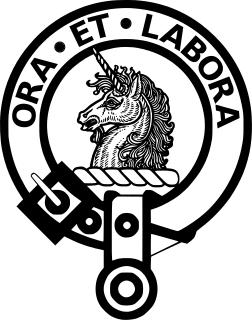
Clan Ramsay is a Lowland Scottish clan.
Andrew Michael Ramsay, commonly called the Chevalier Ramsay, was a Scottish-born writer who lived most of his adult life in France. He was a Baronet in the Jacobite Peerage.

Archibald Douglas, Earl of Douglas and Wigtown, Lord of Galloway, Douglas and Bothwell, called Archibald the Grim or Black Archibald, was a late medieval Scottish nobleman. Archibald was the bastard son of Sir James "the Black" Douglas, Robert I's trusted lieutenant, and an unknown mother. A first cousin of William 1st Earl of Douglas, he inherited the earldom of Douglas and its entailed estates as the third earl following the death without legitimate issue of James 2nd Earl of Douglas at the Battle of Otterburn.
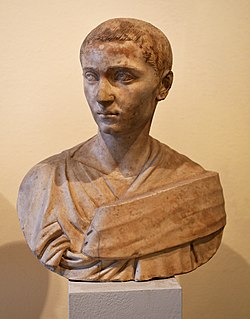
Philip II, also known as Philip the Younger, was the son and heir of the Roman Emperor Philip the Arab by his wife Marcia Otacilia Severa.

Decimus Junius Juvenalis, known in English as Juvenal, was a Roman poet active in the late first and early second century AD. He is the author of the collection of satirical poems known as the Satires. The details of the author's life are unclear, although references within his text to known persons of the late first and early second centuries AD fix his earliest date of composition. One recent scholar argues that his first book was published in 100 or 101. Because of a reference to a recent political figure, his fifth and final surviving book must date from after 127.

Abercius of Hieropolis was a bishop of Hierapolis at the time of Marcus Aurelius, also known as Abercius Marcellus. He was supposedly the successor to Papias.
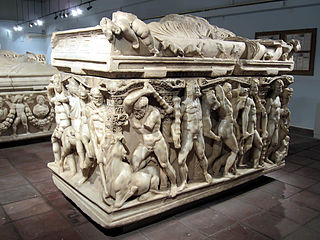
Tiberiopolis was a town in the Roman province of Phrygia Pacatiana, mentioned by Ptolemy, Socrates of Constantinople and Hierocles. At various times, it was considered as part of Phrygia, Isauria, and the late Roman province of Pisidia.
Eucolpius or Encolpius was an Ancient Roman writer of the third century. He is named by Lampridius as the author of a life of the emperor Alexander Severus, with whom he lived upon terms of intimacy.
Vigilius of Thapsus also known as Vigilius Tapsensis, Vigilius Afer, or Vergil of Tapso, was a 5th-century Bishop of Thapsus in the province Byzacium, in what is now Tunisia, and as well as a theological writer and polemicist.
References
 This article incorporates text from a publication now in the public domain : William Ramsay (1870). Smith, William (ed.). Dictionary of Greek and Roman Biography and Mythology .Missing or empty
This article incorporates text from a publication now in the public domain : William Ramsay (1870). Smith, William (ed.). Dictionary of Greek and Roman Biography and Mythology .Missing or empty |title=(help)